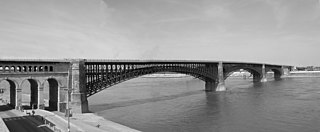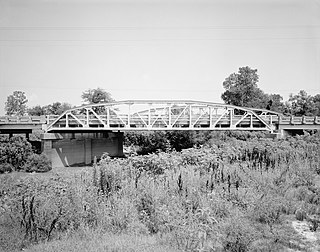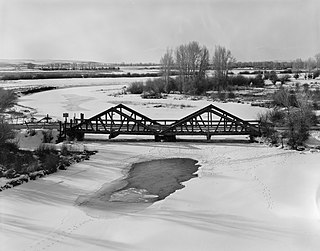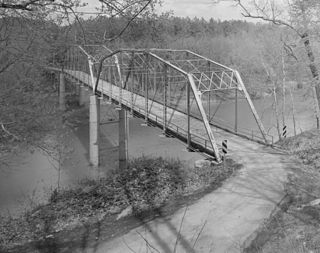
The Smith River is a river flowing from the Klamath Mountains to the Pacific Ocean in Del Norte County in extreme northwestern California, on the West Coast of the United States. It is about 25.1 miles (40.4 km) long, all within Del Norte County, and it flows through the Rogue River – Siskiyou National Forest, Six Rivers National Forest, and Jedediah Smith Redwoods State Park.

A truss bridge is a bridge whose load-bearing superstructure is composed of a truss, a structure of connected elements, usually forming triangular units. The connected elements may be stressed from tension, compression, or sometimes both in response to dynamic loads. The basic types of truss bridges shown in this article have simple designs which could be easily analyzed by 19th and early 20th-century engineers. A truss bridge is economical to construct because it uses materials efficiently.

Colonial Parkway is a 23-mile (37 km) scenic parkway linking the three points of Virginia's Historic Triangle, Jamestown, Williamsburg, and Yorktown. It is part of the National Park Service's Colonial National Historical Park. Virginia's official state classification for the parkway is State Route 90003. With portions built between 1930 and 1957, it links the three communities via a roadway shielded from views of commercial development. The roadway is toll-free, is free of semi trucks, and has speed limits of around 35 to 45 mph. As a National Scenic Byway and All-American Road, it is also popular with tourists due to the James River and York River ends of the parkway. A video drive-thru is available.
The George Washington Memorial Parkway, colloquially the G.W. Parkway, is a 25-mile-long (40 km) parkway that runs along the south bank of the Potomac River from Mount Vernon, Virginia, northwest to McLean, Virginia, and is maintained by the National Park Service (NPS). It is located almost entirely within Virginia, except for a short portion of the parkway northwest of the Arlington Memorial Bridge that passes over Columbia Island within the District of Columbia.

The James River and Kanawha Canal was a partially built canal in Virginia intended to facilitate shipments of passengers and freight by water between the western counties of Virginia and the coast. Ultimately its towpath became the roadbed for a rail line following the same course.
The Wisconsin Bridge and Iron Company (WB&I) is, or was, a fabricator and erector of iron and steel bridges and other large structures.

The Humpback Covered Bridge located in the U.S. state of Virginia, is one of the few remaining covered bridges in the United States that was built higher in the middle than on either end; hence the name of "humpback". The bridge was built in 1857 and is also the oldest remaining covered bridge in the state of Virginia. Its WGCB number is 46-03-01. The bridge spans a tributary of the Jackson River known as Dunlap Creek, for a distance of 109 feet (33 m). The humpback feature is 4 feet (1.2 m) higher in the center than at either end. The bridge is located near the city of Covington, Virginia.

State Route 80 is a primary state highway in the southwest part of the U.S. state of Virginia. It runs from the Kentucky state line at Breaks Interstate Park east to U.S. Route 11 near Meadowview. Kentucky Route 80 and Missouri's Route 80 continue the number west to Matthews, Missouri.

The Phoenix Iron Works, located in Phoenixville, Pennsylvania, was a manufacturer of iron and related products during the 19th century and early 20th century. Phoenix Iron Company was a major producer of cannons for the Union Army during the American Civil War. The company also produced the Phoenix column, an advance in construction material. Company facilities are a core component of the Phoenixville Historic District, a National Register of Historic Places site that was in 2006 recognized as a historic landmark by ASM International.

The Cambria Iron Company of Johnstown, Pennsylvania was a major 19th-century industrial producer of iron and steel. Founded in 1852, it had the nation's largest steel foundry in the 1870s, and was renamed the Cambria Steel Company in 1898. The company used many innovations in the steelmaking process, including those of William Kelly and Henry Bessemer. The company was acquired in 1923 by the Bethlehem Steel Company. The company's historic facilities, extending some 12 miles (19 km) along the Conemaugh and Little Conemaugh Rivers, are a National Historic Landmark District.

The King Iron Bridge & Manufacturing Company was a late-19th-century bridge building company located in Cleveland, Ohio. It was founded by Zenas King (1818–1892) in 1858 and subsequently managed by his sons, James A. King and Harry W. King and then his grandson, Norman C. King, until the mid-1920s. Many of the bridges built by the company were used during America's expansion west in the late 19th century and early 20th century, and some of these bridges are still standing today.

The Keystone Bridge Company, founded in 1865 by Andrew Carnegie, was an American bridge building company. It was one of the 28 companies absorbed into the American Bridge Company in 1900. The company advertised its services for building steel, wrought iron, wooden railway and road bridges. It held a patent for wrought iron bridges and also supplied wrought iron columns for buildings. Thomas Carnegie worked for Keystone Bridge as treasurer for roughly 20 years, from the founding of the company until his death in 1886.

The Catoctin Creek Bridge crosses over Catoctin Creek in Loudoun County, Virginia.

The Vincennes Bridge Company, based in Vincennes, Indiana, was a designer and builder of bridges that was "one of Indiana's 'most successful bridge-building firms'".

The AJX Bridge is a historic Pratt truss bridge in southwestern Johnson County, Wyoming. The bridge was built in 1931 across the South Fork of the Powder River near Kaycee, Wyoming. AJX Bridge was built to provide a river crossing for U.S. Route 87. It was placed on the National Register of Historic Places in 1985 as part of a Multiple Property Submission devoted to historic bridges in Wyoming.

The DDZ Bridge over New Fork River is a Kingpost pony truss bridge located near Boulder, Wyoming, which carries Sublette County Road 136 across the New Fork River. The bridge was built in 1917 by Lincoln County's government, as Sublette County had not yet been formed. Unlike most truss bridges at the time, the bridge was built with timber trusses rather than steel; it is the only wooden two-span Kingpost truss bridge remaining in Wyoming. The bridge's construction is considered to be "the most sophisticated" of extant wooden truss bridges in the state.

Clarkton Bridge was a historic Pratt truss bridge located over the Staunton River near Nathalie, in Charlotte County, Virginia. It was built in 1902 by the Virginia Bridge & Iron Co., and was the only remaining metal truss structure in Virginia built for highway purposes, which was supported by steel cylinder piers. It consisted of two camelback, pin-connected steel through truss channel spans, and twelve steel deck beam approach spans. The overall dimensions of the bridge approach and truss spans were as follows: north approach, 370 feet (110 m) with twelve deck spans; north truss, 150 feet (46 m); south truss, 150 feet (46 m). The total length of the bridge was 692 feet (211 m).

Linville Creek Bridge is a historic Hybrid Pratt-Warren Truss bridge located near Broadway, Rockingham County, Virginia. It was built by the Wrought Iron Bridge Company in 1898. It is a single span, measuring 133 feet 4 inches (40.64 m) long.
The Fink truss is a commonly used truss in residential homes and bridge architecture. It originated as a bridge truss although its current use in bridges is rare.
















